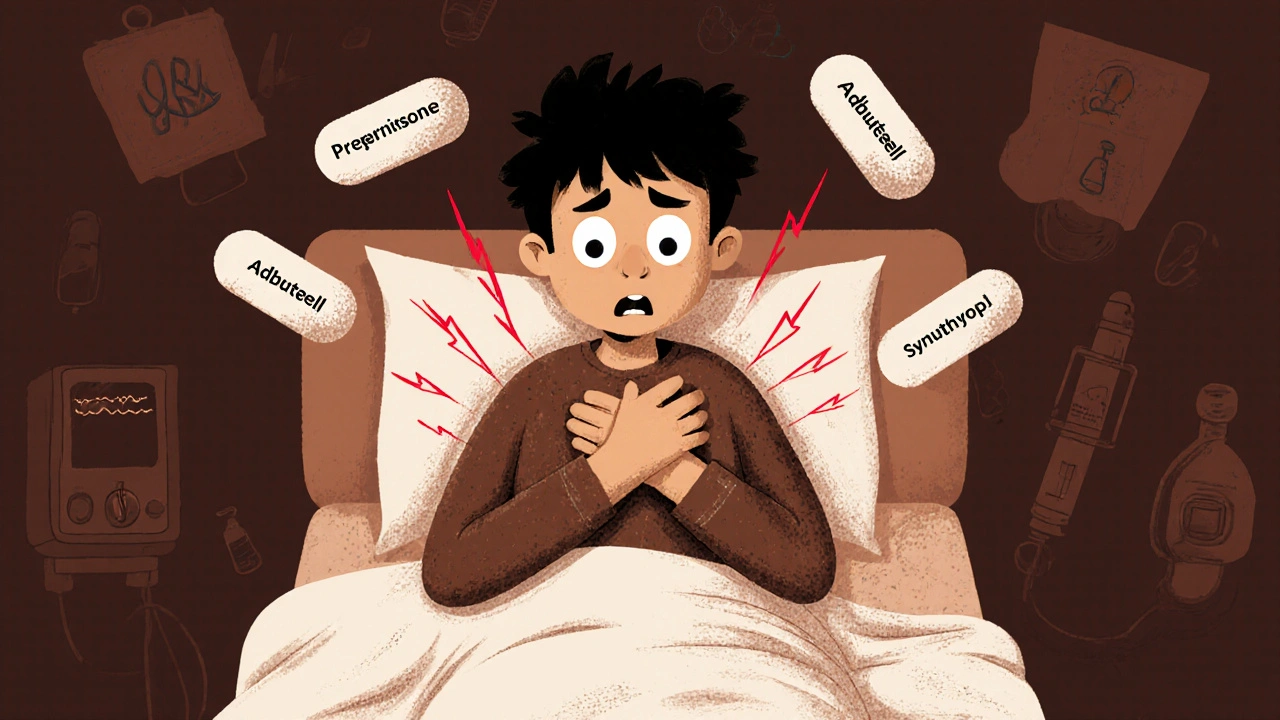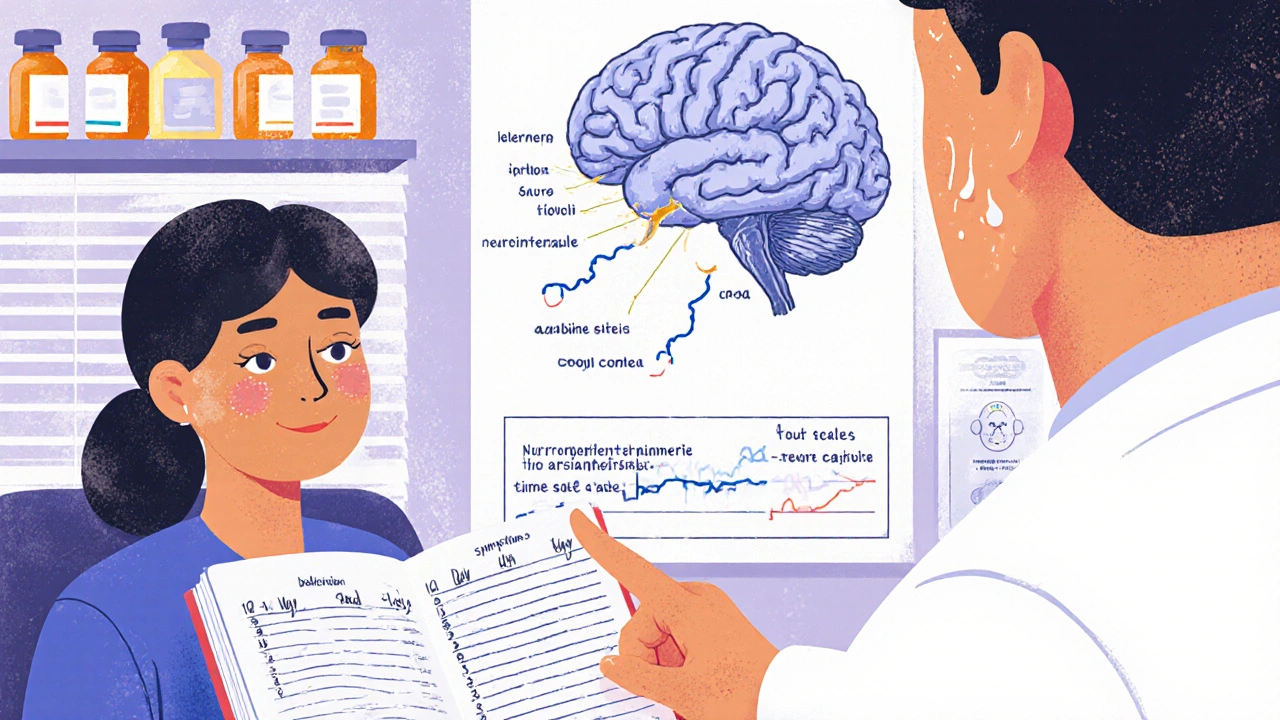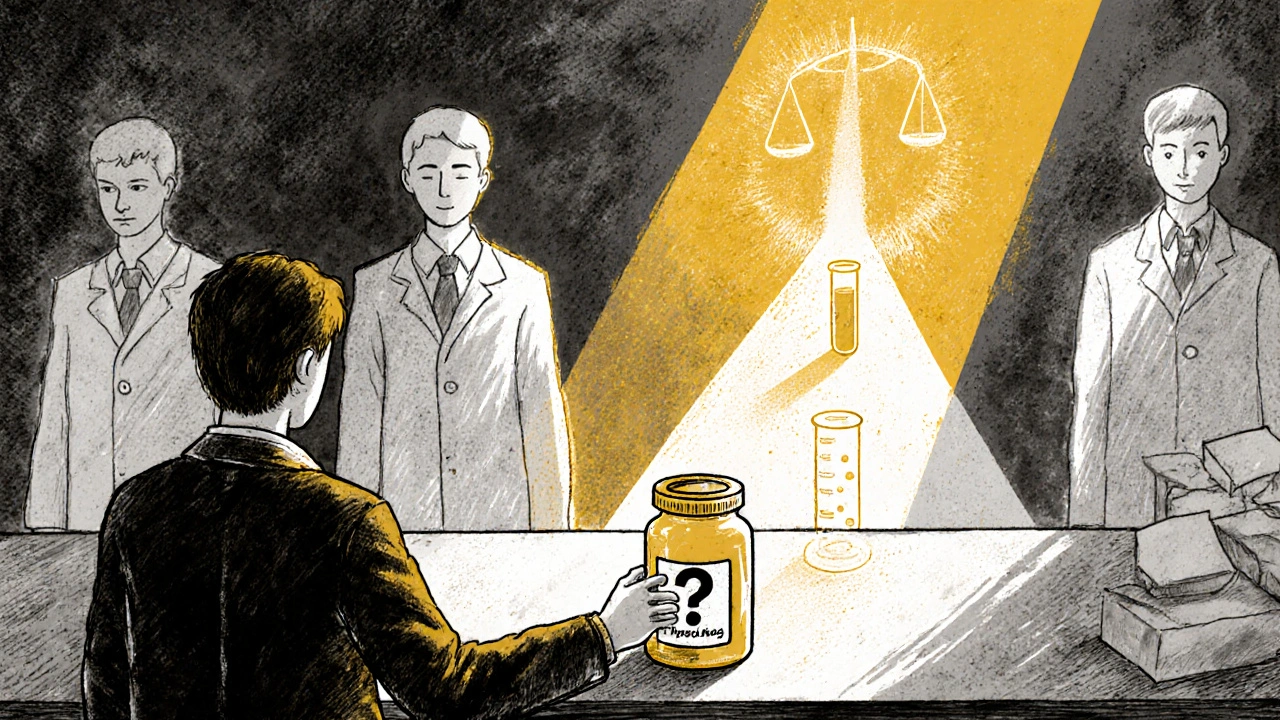Anxiety and Nervousness Caused by Medications: Common Triggers and What to Do

Medication Anxiety Checker
Check if Your Anxiety is Medication-Induced
It’s not just in your head - sometimes, the anxiety you’re feeling comes from a pill you took yesterday. Millions of people start a new medication for a clear health reason - maybe for asthma, thyroid issues, or ADHD - and soon after, they feel jittery, panicked, or on edge. They assume it’s stress, burnout, or a mental health issue. But what if it’s the medicine itself?
Medications That Can Trigger Anxiety
Not all anxiety is psychological. Some of it is chemical. Certain drugs directly affect brain signaling, heart rate, or stress hormones - and that can turn calm days into panic-filled ones. Here are the most common culprits:
- Corticosteroids like prednisone and hydrocortisone - often prescribed for inflammation or asthma flares - can cause mood swings, irritability, and full-blown panic attacks, especially at high doses. One study found up to 20% of patients on long-term steroids reported significant anxiety symptoms.
- ADHD stimulants - Adderall, Vyvanse, Ritalin - boost dopamine and norepinephrine to improve focus. But for some, that boost becomes too much. Restlessness, racing thoughts, and heart palpitations are common side effects. About 1 in 5 people on these meds report increased anxiety.
- Asthma inhalers like albuterol (Proventil) and salmeterol (Serevent) can cause trembling, fast heartbeat, and nervousness. These aren’t just side effects - they mimic panic attack symptoms exactly.
- Thyroid meds like levothyroxine (Synthroid) are meant to fix low hormone levels. But if the dose is too high, your body goes into overdrive. Symptoms include sweating, rapid pulse, trouble sleeping, and constant worry. The American Thyroid Association says keeping TSH between 0.4 and 4.0 mIU/L helps avoid this.
- Decongestants like pseudoephedrine (Sudafed) constrict blood vessels. That’s good for a stuffy nose, but it can also spike blood pressure and trigger anxiety, especially in people sensitive to stimulants.
- Antibiotics like fluoroquinolones (Cipro, Levaquin) have been linked to anxiety, insomnia, and even hallucinations in rare cases. The FDA issued warnings about these in 2016, and reports still come in.
- Seizure drugs and anesthesia agents can also disrupt brain chemistry enough to cause anxiety during or after use.
What’s worse? Many of these are prescribed for short-term use - like steroids for a flare-up or pseudoephedrine for a cold. People don’t expect a 5-day course to wreck their mental state. And when they go to their doctor, they’re often told to "just relax" or "try meditation." But the real fix isn’t mindfulness - it’s medication review.
How Medications Cause Anxiety: The Science Behind It
Your brain runs on chemicals. Serotonin, dopamine, norepinephrine - they control mood, alertness, and fear responses. When a drug interferes with those signals, your body doesn’t know the difference between real danger and a side effect.
Stimulant ADHD meds flood the brain with norepinephrine. That’s meant to sharpen focus, but it also activates your fight-or-flight system. Your heart races, your palms sweat, your mind jumps from thought to thought - classic anxiety symptoms. It’s not a panic disorder. It’s pharmacology.
Corticosteroids work differently. They mess with your HPA axis - the system that controls stress. When this system gets thrown off, your body produces too much cortisol, even when there’s no stressor. That leads to constant tension, sleep loss, and emotional spikes.
Thyroid meds? Too much hormone = your metabolism goes into overdrive. Your body thinks it’s under siege. Your heart pounds. You can’t sit still. You feel like you’re falling apart - but it’s just chemistry out of balance.
And here’s the tricky part: these symptoms look exactly like generalized anxiety disorder (GAD). That’s why so many people get misdiagnosed. The DSM-5 says GAD needs symptoms lasting at least six months - but if the anxiety started the week you began prednisone, it’s not GAD. It’s medication-induced.
How Long Does Medication-Induced Anxiety Last?
Good news: it usually goes away. But timing matters.
For short-acting drugs like albuterol or pseudoephedrine, symptoms often fade within 24 to 48 hours after stopping. For stimulants like Adderall, it can take 3 to 7 days for the brain to reset. Corticosteroids? If you’ve been on them for weeks, stopping cold turkey can make anxiety worse. That’s why doctors recommend tapering - slowly lowering the dose over days or weeks.
Thyroid meds are different. If your dose is too high, anxiety won’t disappear until your TSH levels normalize. That can take 4 to 6 weeks after a dose change because your body needs time to adjust hormone levels.
According to the NIH, if you’ve taken a long-acting drug like Valium or methadone, you may need 4 to 8 weeks of abstinence before you can tell if anxiety was caused by the drug or existed before it. This delay is why many people suffer for months before getting the right diagnosis.

What to Do If You Think Your Medication Is Causing Anxiety
Don’t stop cold. Don’t assume it’s "all in your head." Do this instead:
- Track your symptoms. Keep a daily log: What time did you take the med? When did anxiety start? How bad was it (1 to 10)? Did it happen after every dose? A journal helps your doctor spot patterns.
- Check the timeline. Did anxiety start within days of starting the new drug? That’s a red flag. If it started months later, it might be something else.
- Don’t wait. If anxiety is severe - panic attacks, chest pain, trouble breathing - call your doctor immediately. Don’t wait for your next appointment.
- Ask about alternatives. For ADHD: can you switch from Adderall to Strattera? For asthma: can you use a different inhaler? For thyroid: can your dose be lowered? For steroids: can you use a lower dose or shorter course?
- Ask about dose timing. Sometimes taking a stimulant earlier in the day - not at night - reduces nighttime anxiety and sleep disruption.
One patient, "ThyroidWarrior," shared on HealthUnlocked that it took three doctors and three months to realize her anxiety wasn’t depression - it was her Synthroid dose. Once it was lowered, her panic attacks stopped. She didn’t need therapy. She needed a lab test.
What Doctors Should Be Doing - But Often Don’t
Consumer surveys show 42% of people with medication-induced anxiety wait more than three months before their doctor connects the dots. Why? Because most doctors don’t ask about mental side effects when prescribing.
They focus on blood pressure, liver enzymes, cholesterol - not mood. But anxiety isn’t a side effect you can ignore. It affects sleep, work, relationships, and can even make physical health worse.
Experts say: Always ask - "What are the mental health side effects of this drug?" Especially if you have a history of anxiety, depression, or panic attacks. If you’re on multiple meds, the risk multiplies. One study found patients taking three or more anxiety-triggering drugs had a 60% higher chance of developing medication-induced anxiety.

When to Use Therapy Alongside Medication Changes
Changing a drug doesn’t always fix anxiety overnight. Your brain might still be wired to expect panic. That’s where CBT (Cognitive Behavioral Therapy) helps.
CBT doesn’t treat the medication - it treats the fear of the symptoms. If your heart races after taking a pill, CBT helps you reframe it: "This is a side effect, not a heart attack. It will pass." Studies show CBT reduces anxiety symptoms by 60-70% in people going through medication adjustments.
It’s not a replacement for stopping the drug. It’s a bridge - helping you stay calm while your body resets.
Prevention Is Possible
You don’t have to wait until anxiety hits to act. Here’s how to prevent it:
- Ask your doctor: "Could this cause anxiety?" before starting any new medication.
- Start with the lowest effective dose - especially for stimulants and steroids.
- Get regular blood tests if you’re on thyroid meds. TSH levels should be checked every 6 to 8 weeks after a dose change.
- Avoid combining multiple anxiety-triggering drugs. For example, don’t take pseudoephedrine with Adderall unless absolutely necessary.
- If you’ve had anxiety before, tell your doctor. Your risk is higher.
There’s no shame in needing help. But there’s a lot of harm in blaming yourself for something your medicine caused. The body doesn’t lie - if your anxiety started with a pill, the pill is likely the trigger.
What’s Next? Research and Better Guidelines
Scientists are now looking at genetics to predict who’s at risk. A 2022 study found people with certain CYP2D6 gene variants are more likely to develop anxiety from stimulants and antidepressants. That means one day, a simple blood test could tell you: "This med might make you anxious. Try this one instead." The National Institute of Mental Health is investing $2.3 million into this research between 2023 and 2025. The American Psychiatric Association is also updating its diagnostic guidelines for the next DSM, hoping to make it easier for doctors to spot medication-induced anxiety.
For now, the best tool you have is awareness. Know your meds. Track your symptoms. Speak up. Your anxiety might not be a mental health issue - it might just be a side effect waiting to be fixed.
This is the exact reason I stopped Adderall last year. I thought I was burning out-turns out my heart was racing because of a 20mg dose. My doctor acted like I was being dramatic until I showed him the timeline. Now I’m on Wellbutrin and actually sleep at night. Stop blaming yourself-meds can mess with your head in ways you never expect.
Let me tell you, I’ve been through the wringer with this stuff. I was on prednisone for a bad asthma flare-up-five days, 40mg a day. By day three, I was pacing the kitchen at 3 a.m., convinced my apartment was on fire. No smoke. No sound. Just pure, electric panic. I went to my GP and they handed me a pamphlet on breathing exercises. I wanted to scream. It wasn’t anxiety-it was a chemical grenade going off in my limbic system. I tapered off slowly, kept a symptom log like the article said, and within ten days, I was human again. If you’re on steroids, don’t ignore the mental side effects. They’re not optional. They’re part of the package. And if your doctor doesn’t take it seriously? Find a new one. Your peace of mind isn’t a luxury-it’s a necessity.
The article accurately identifies the physiological mechanisms underlying medication-induced anxiety; however, it neglects to emphasize the importance of distinguishing between transient side effects and persistent neuropsychiatric alterations. For instance, while albuterol-induced tremors typically resolve within 48 hours, prolonged norepinephrine elevation from stimulants may induce synaptic remodeling, particularly in the amygdala. Furthermore, the recommendation to monitor TSH levels every six to eight weeks is evidence-based, but it should be contextualized with free T3 and T4 measurements, as subclinical hyperthyroidism often precedes overt symptoms. Finally, the genetic component-CYP2D6 polymorphisms-requires clinical screening, not anecdotal observation.
Oh, so now it’s not ‘just anxiety’-it’s the meds? Wow. Groundbreaking. I’m sure every psychiatrist in the world is just sitting around drinking coffee, ignoring the fact that albuterol can make you feel like you’re being chased by a bear. But hey, if you’re too lazy to meditate or journal, just blame the pill, right? At least you didn’t have to deal with the real work of figuring out why your brain’s on fire. Also, ‘ThyroidWarrior’? That’s not a person. That’s a Reddit username.
I’ve been on levothyroxine for five years. My TSH is 0.8. I’ve never felt better. So why are you telling me I’m going crazy because of my thyroid med? Are you saying everyone on this stuff is just ‘misdiagnosed’? What about the people who actually have GAD? Are we just supposed to ignore them? And who the hell is ‘ThyroidWarrior’? Sounds like a guy who Googled ‘anxiety’ and then wrote a manifesto. I’ve had panic attacks since I was 14. I don’t need a pill to blame. I need help.
This is a compelling and clinically relevant overview. However, I would like to draw attention to the cultural dimension of this issue. In many non-Western healthcare systems, particularly in regions with limited psychiatric infrastructure, medication side effects are routinely dismissed as ‘nervousness’ or ‘weakness of character.’ The emphasis on patient advocacy in this article is therefore not merely medical-it is a form of social justice. Furthermore, the underreporting of psychiatric adverse events in clinical trials remains a systemic problem. Pharmaceutical companies are not incentivized to study mood effects in short-term regimens, even though these are the most commonly prescribed. This gap demands regulatory reform.
I took pseudoephedrine for a cold last winter and spent three days convinced I was having a stroke. My hands shook. My chest felt like it was being crushed. I called 911. They said I was fine-just decongestant side effects. I cried in the ER. No one asked if I’d ever had anxiety before. I didn’t even know it could happen from Sudafed. I thought I was broken. Turns out, I was just overdosed on a nasal spray. Now I carry a little card in my wallet: ‘If I panic, it might be the meds. Don’t assume it’s me.’ I wish I’d had this article then.
Man, this is the kind of post that makes me feel less alone. I was on Vyvanse for ADHD, and for six months I thought I was losing my mind-jittery, irritable, screaming at my dog for no reason. I was too ashamed to tell anyone. Then I read a Reddit thread about stimulant-induced anxiety and it clicked. I went to my doc, asked for a switch, and got put on non-stimulant meds. I didn’t need to ‘fix’ my brain. I just needed to stop poisoning it. Now I’m calmer, more focused, and I actually like being around people again. To anyone reading this: you’re not broken. You’re just on the wrong pill. Speak up. Your brain deserves better than a placebo in a capsule.
Just one sentence: I was on prednisone for seven days, and I cried during a Zoom meeting because I couldn’t stop feeling like I was going to die-and no one asked if it was the meds.